Social Sciences
Hi everybody!
Today in the class of Social Sciences we have started a new unit:
The Interwar Period (1919-1939)
1. The U.S.A: from the "Roaring Twenties" to the Great Depression
2. Fascist Italy
3. Nazi Germany
Before the class started, I have gone to the secretary's office to phone my parents because I have missed my glasses at home. Then, when I have arrived to class, everybody was discussing about the day to take the exam of this unit and finally we have decided to take it on the 9th of June.
After all this, we have started with the first point of the unit.
Today I have learnt that after WW1, the USA became the most important economic power in the world and the most important creditor of the European countries because the USA's productive system was intact after the war. They were the owners of half of the gold reserves and their currency, the dollar, became the predominant one in international trade.
The American way of life became a model. The USA attracted thousands of immigrants under the motto: "USA, land of opportunity" or "There's no way like the American way"
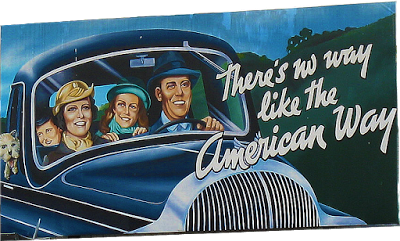
http://allenbwest.com/2014/07/truth-american-way/
Then, Paqui has explained us that consumer society spread a lot thanks to installments and credits, while in Europe they were trying to recover the economy. But all wasn't as perfect as it seems because a lot of people were still living in poverty.
Later Paqui has explained us that between 1919 and 1933 the production sale and consumption of alcohol were forbidden because of the Prohibition. As the members of the parliament were so puritanical they approved the Prohibition, but this only caused the discontent of the citizens and the extraordinary development of the mafia and famous figures like Al Capone.

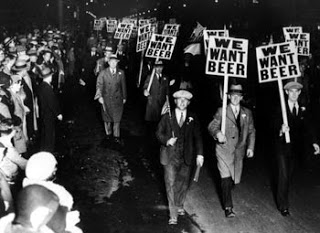
Men againt the Prohibition Alcapone
http://www.realbeer.com/blog/?p=86 http://forum.joomla.hr/index.php?topic=4062.0
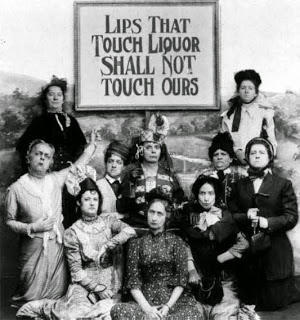
Women in favour of the Prohibition
http://thecanberran.com/2013/08/16/dry-bars-the-pubs-with-no-beer/
After this, we have talked about racism in that period and that even if slavery was forbidden after the Civil War, many black people continued to be discriminated and they were hounded by the Ku Klux Klan, a racist organization related to white supremacism, whose members wore costumes similar to the ones used in Spain to celebrate the Holy Week. Nowadays they continue to exist in the south states of the USA.
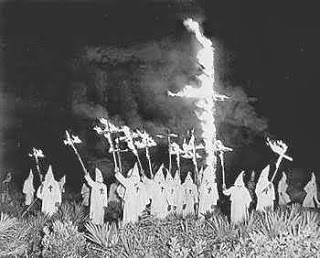
Members of the Ku Klux Klan
http://ro.wikipedia.org/wiki/Ku_Klux_Klan
To end with the class we have talked about the symptoms of crisis. There was a huge demand for all kind of products, for example: farmers bought more land to increase production. Many people invested in the Stock Market because getting loans was very easy.
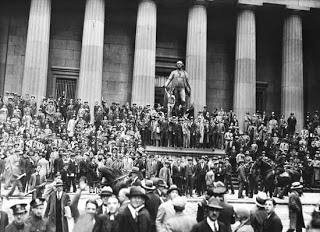
- Friday 29th May 2015
I have liked the lesson of Social Sciences today. We have continued with the relief to farmers and workers. We have finished that and we started with the Social legislation(we have written four points of this) and the economic legislation(the banking...
- 16 Th April 2015 ( Thursday)
Hello I am José Luis and this is my journal: Today the class started at third period. Today was the make up exam , this exam has been taken by Gustavo , José and Lucía. I think thtat all are going to pass the exam. During the class the...
- Jobs @ North Bengal University
http://www.nbu.ac.in/recruit.html Applications are invited form the Indian citizens in the prescribed format within 19th February, 2014 for engagement to the following positions in the Centre for Women’s Studies purely on contractual basis...
- Macarthur Foundation Housing Research Proposals
Today, The MacArthur Foundation issued a request for housing research proposals as part of its How Housing Matters to Families and Communitiesprogram, a five-year, $25 million research initiative to deepen the literature on the effect...
- Invitation To Attend A Seminar At Nassdoc On 10.12.2012 @ 5 Pm
Society for Library Professionals (SLP) andNational Social Science Documentation Centre (NASSDOC), ICSSRCordially invite you to attend a SeminarSpeaker:Kanako Sakai (Ms.)Institute of DevelopingEconomies-JETROChiba, JapanTopic:IDE...
Social Sciences
Thursday 21st of May
Hi everybody!
Today in the class of Social Sciences we have started a new unit:
The Interwar Period (1919-1939)
1. The U.S.A: from the "Roaring Twenties" to the Great Depression
2. Fascist Italy
3. Nazi Germany
Before the class started, I have gone to the secretary's office to phone my parents because I have missed my glasses at home. Then, when I have arrived to class, everybody was discussing about the day to take the exam of this unit and finally we have decided to take it on the 9th of June.
After all this, we have started with the first point of the unit.
Today I have learnt that after WW1, the USA became the most important economic power in the world and the most important creditor of the European countries because the USA's productive system was intact after the war. They were the owners of half of the gold reserves and their currency, the dollar, became the predominant one in international trade.
The American way of life became a model. The USA attracted thousands of immigrants under the motto: "USA, land of opportunity" or "There's no way like the American way"

http://allenbwest.com/2014/07/truth-american-way/
Then, Paqui has explained us that consumer society spread a lot thanks to installments and credits, while in Europe they were trying to recover the economy. But all wasn't as perfect as it seems because a lot of people were still living in poverty.
Later Paqui has explained us that between 1919 and 1933 the production sale and consumption of alcohol were forbidden because of the Prohibition. As the members of the parliament were so puritanical they approved the Prohibition, but this only caused the discontent of the citizens and the extraordinary development of the mafia and famous figures like Al Capone.


Men againt the Prohibition Alcapone
http://www.realbeer.com/blog/?p=86 http://forum.joomla.hr/index.php?topic=4062.0

Women in favour of the Prohibition
http://thecanberran.com/2013/08/16/dry-bars-the-pubs-with-no-beer/
After this, we have talked about racism in that period and that even if slavery was forbidden after the Civil War, many black people continued to be discriminated and they were hounded by the Ku Klux Klan, a racist organization related to white supremacism, whose members wore costumes similar to the ones used in Spain to celebrate the Holy Week. Nowadays they continue to exist in the south states of the USA.

Members of the Ku Klux Klan
http://ro.wikipedia.org/wiki/Ku_Klux_Klan
To end with the class we have talked about the symptoms of crisis. There was a huge demand for all kind of products, for example: farmers bought more land to increase production. Many people invested in the Stock Market because getting loans was very easy.
- Real estate bubble: a lot of houses were built and easily sold, but the prices increased due to the high demand.
- Stock Market bubble: many people invested money without any knowledge of economics. Stock prices increased a lot due to the high demand
- High debts to keep high levels of production and consumption (Cash-flow problems)
- When the European started recovering, there was a contraction of the demand for USA products and an overproduction crisis started: products couldn't be sold, stocks started accumulating, farmers couldn't give their loans bank...
- No correspondence between the real economic situation of the companies and the value of their stocks in the Stock Exchange Market (Stock Exchange bubble)

Stock Market crash, 1929
http://storiesofusa.com/great-depression-causes-new-deal-1919-1939/
When the bell has rang, Paqui has given us homework: the exercises 1, 2 and 3 of the page 72
That's all for now! See you in class!
Words copied on the glossary:
Roaring: rugiente
To roar: rugir
Roaring Twenties: felices años 20
Interwar: entreguerra
Real estate: inmobiliaria
Stock Exchange Market: bolsa de valores
Pound: libra
In instalments: a plazos
Banking loans: créditos bancarios
Washing place/site: lavadero
Prohibition: Ley Seca
Speakeasy: bar ilegal
Temperance League: Liga de Abstinencia
To tax: gravar con un impuesto
To hound: cazar
Hound dog: perro de caza
Foreclosure: desahucio
- Friday 29th May 2015
I have liked the lesson of Social Sciences today. We have continued with the relief to farmers and workers. We have finished that and we started with the Social legislation(we have written four points of this) and the economic legislation(the banking...
- 16 Th April 2015 ( Thursday)
Hello I am José Luis and this is my journal: Today the class started at third period. Today was the make up exam , this exam has been taken by Gustavo , José and Lucía. I think thtat all are going to pass the exam. During the class the...
- Jobs @ North Bengal University
http://www.nbu.ac.in/recruit.html Applications are invited form the Indian citizens in the prescribed format within 19th February, 2014 for engagement to the following positions in the Centre for Women’s Studies purely on contractual basis...
- Macarthur Foundation Housing Research Proposals
Today, The MacArthur Foundation issued a request for housing research proposals as part of its How Housing Matters to Families and Communitiesprogram, a five-year, $25 million research initiative to deepen the literature on the effect...
- Invitation To Attend A Seminar At Nassdoc On 10.12.2012 @ 5 Pm
Society for Library Professionals (SLP) andNational Social Science Documentation Centre (NASSDOC), ICSSRCordially invite you to attend a SeminarSpeaker:Kanako Sakai (Ms.)Institute of DevelopingEconomies-JETROChiba, JapanTopic:IDE...
